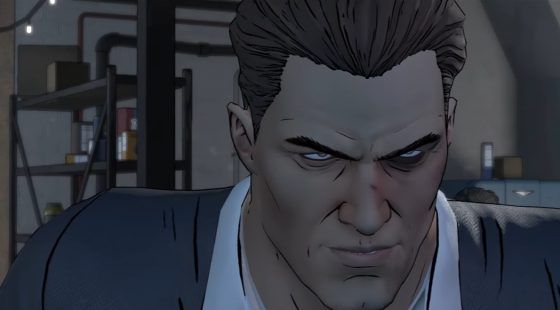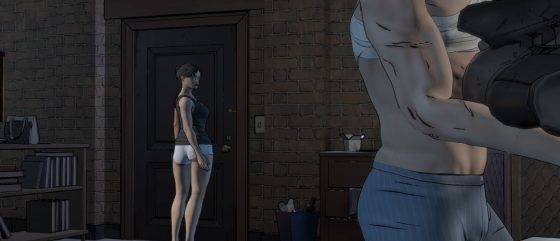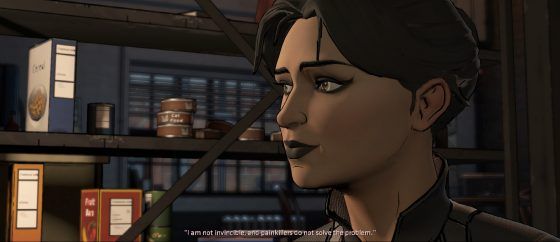I've done my best to avoid as many spoilers as possible when discussing my impressions of Batman: The TellTale Series, but Episode 3 is when that sadly has to end. Episode 1 built a premise that could be hinted at, and Episode 2 set up the pieces, but Episode 3 is where these pieces start to really interact in very unique ways. TellTale's unique spin on Batman's mythos combined with branching storytelling while emphasizing the dual nature of Batman/Bruce Wayne is why this is the episode I have to stop avoiding spoilers and engage them full on because the specifics paint a picture you simply can't appreciate without the full context. If you're worried about spoilers, wait until you've played the game for yourself, or heck, go out and buy it now. The first three episodes alone make it worth it, even if I'm a bit worried about Episode four.
Playing Bat-God
As I mentioned in Episode 2, I made a critical decision that felt like it'd change the Batman mythos in a serious way. For those who couldn't guess, here it is: I prevented Harvey from having his face scarred, which I thought might prevent him from becoming Two-Face. While Batman has a lot of enemies, Two-Face's birth from friend Harvey Dent has always forced Batman to recognize the good in his enemy in ways that the villain (or his "evil" half) has exploited. This is key, because throughout the episode, I kept Harvey's safety as a top priority, and this is a bit out of character for me.
See, I like to play the games "in character," as if I'm Batman and don't know I can prevent a bad guy from being created. However, very early into Episode three, we get a plot split that forces us to choose between helping Harvey or someone else. I nearly sided against my inner roleplayer but realized (or hoped) Batman would make the same choice as I was tempted to because it's more about the long game. While the other choice did seem to pose an immediate danger, Harvey did seem like he'd do well as mayor, even if he was willing to work with the gang. At the very least, he'd dealt with a lot of other criminals, and heck, having Batman on his side (as we see later) really does give Harvey confidence.
Going through multiple decisions, constantly telling Harvey to get help and talking him down, may be futile. Unlike the Two-Face we're used to, TellTale is able to show Harvey's dual nature without getting too literal. Though one side of his face does get roughed up no matter what, he is, physically, whole. His dialogue, in part thanks to some great voice acting by Travis Willingham, shows a fractured man I think many of us can relate to, but especially those of us who work in public spheres. There are times in our life where we have to make social decisions, choosing to "get stepped on" or hold back our real feelings when they may cause us to lose face. This is the way TellTale has set up Two-Face, as a politician whose job demands it, but as one who has worked very hard to make allies and fears his "mask" makes him weak. In a lot of ways, this is one of the best portrayals of Dent I've experienced.
That being said, TellTale does end up getting heavy handed with the character as we inch closer to a full blown case of Two-Face. Dent's demonic personality forcing the two to flip coins to make a decision feels like it comes out of nowhere. It feels ridiculous. Had Harvey simply flipped a coin to make a decision once or twice before we'd have more easily accepted the character's reliance on chance to make up his minds. However, as we only see it while Harvey's other half is seeping through, it feels forced. I am wondering if it's even needed, but I'll reserve my final decision for the finale.
The Myth of Love
On the one hand, we have these hints that Harvey needs our help threaded throughout the episode. However, we also have a chance (?) encounter with Catwoman. In some ways, Catwoman is perhaps one of the characters who has gone through the fewest changes. Catwoman is the bad girl who has a good side but won't embrace it, Batman, as an optimist trying to "fix" her. It's cliche, it's normal. However, the character is a bit more complex than that.
When exploring Selina's books, Bruce notes that she has a copy of Gita Govinda. This is interesting because it's largely about the male and female aspects of a Hindu god. They are one, but have separate aspects with love each other unconditionally. The two are constantly tested, separated, and long for each other. It's another clear sign that someone at TellTale is really looking at the mythological perspective of comic books and dropping hints about how, despite time and cultural changes, some things remain true, and it's here, right in the middle of our comic-based video game. I'm sure someone can do a Yin and Yang comparison based on the romance scene you can experience, but it's important to note that if Batman is passive, Catwoman will be active. She does make Bruce consent to what happens after she kisses him, which is an interesting role reversal and also serves to show that the character isn't simply a damsel in distress. Catwoman is shown to be quite capable and doesn't seem to hold a grudge against Batman if he chose Harvey over her.
This take on Catwoman is, well, impressive. A strong, active female is something pop culture could use a lot more of. The only problem is that, rethinking a certain scene, I am slightly concerned that this is all a setup. That Selina makes a move on Bruce as some sort of plot she's put up to by The Children of Arkham. I'm sincerely hoping I'm wrong, but it remains to be seen.
That being said, I didn't realize that until after the player is done dealing with Selina, and Harvey for that matter. The scenes with Selina are so well done that I'd actually forgotten about my loyalty to Harvey and never considered his feelings. Mostly, I considered that (in another role reversal) Batman was alone and vulnerable and needed to play nice or potentially risk physical harm. He was the one who needed to be saved, and it was by someone who really didn't owe him anything at this point, especially as I had previously chosen Harvey over her. It made her endearing, but also someone to take seriously as a potential ally, as having her as an adversary had already been annoying, to say the least. As long as TellTale doesn't have Selina acting in these scenes, the character was remarkably well handled.
All of this is why bringing Harvey in and doing the love triangle doesn't feel cheap but organic. We're dealing not just dealing with Batman's part time friends or enemies. The dual nature of everyone's relationship, friend and foe, citizen and criminal, is already complex, but their joint histories and duality are among the best in the Batman mythos. Few other characters could have been used to set this up, and the way things play out, it feels like this would have happened naturally whether or not the player chooses to make any moves on Selina (consent to them). It feels not just believable, but organic, and being able to help Harvey through this, or at least delay his transformation, is a really "Batman" feeling.
That Batman Feeling
While the Batman VR game emphasizes "being" Batman, it does so in a way that is problematic for a lot of VR: its focus on surface appearance rather than experience. It's nice that it emphasizes Batman's detective skills but fails to include the whole of Batman, which is Bruce Wayne and his relationship to others. Batman's sidekicks are more than that, and a simple murder mystery in first person view misses so many aspects of what it'd be like to be Batman. TellTale clearly understand this.
Though not uncommon, Batman's fate being at the mercy of Bruce Wayne's checkbook is an idea rarely touted, much less threatened. We get a big dose of that in this episode, and I know I'm not the only person hoping a certain mission outcome didn't screw us over now that we're supposedly unable to make repairs.
Romance is an area that even as a child didn't feel natural to Batman. He's generally seen as strong and capable and invincible, but as TellTale is starting with his early life, he's far from that. Where many people probably chose to romance Catwoman because, well, she's awesome, I nearly chose not to because I wouldn't want to endanger her, even if she's probably capable of saving herself. I figure that's who Batman would be. Would be. Then I realize how big my job is, how many enemies I have, and that it's spread between two personalities who are both, essentially, public figures. I am in dire need of allies. I won't lie though, I've also always had a thing for Catwoman, and TellTale makes her even more attractive in this game. Not physically, but as a person.
For example, there's an opportunity to invite Catwoman to come live with you, at least for a bit, at Wayne Manor. I actually barely had a second thought about it. She already knows Bruce's secret, and although she's a crook, Batman's a detective. Even better, it gives Bruce a way to research some of her tech, put her to work, and maybe even on payroll, not so much to keep her out of trouble but to put her talents to use in a way that might satisfy her. Clearly she doesn't care about having expensive things, as we saw from her apartment and the way she and her cat eat. She may not like being in debt to others, but she seems to pay people back.
And it's this line of thinking that I, as a kid, teenager, and adult, hadn't seriously considered before this game. Without feeling like Batman was vulnerable, it never occurred to me how tempting it would be to recruit Catwoman. They've teamed up multiple times, but the fact that Bat-mythos hasn't made them a couple yet now almost feels perplexing, aside from storylines where Catwoman isn't privy to who is under the cowl.
Again, though, the game isn't perfect. There's some Iceberg banter that was pretty cheesy, but it's also something I'd expect from a comic book. I feel the medium's capable of great maturity, so that kind of obvious wordplay with boats and sinking makes me groan, but maybe some people like it. Another issue is that some choices didn't have reactions I expected, as usual. Maybe some emotional icon mixed with mood colors should be near decisions to help convey the tone.
However, there is one particular sin that's hard to forget, and that's the animation during intimate moments with Catwoman. The animation is far from perfect and leaves an awkward feeling of having watched two dolls get mashed together. Perhaps using shadows to show the intimacy would have been in better taste, and capable of teasing more. As a grown adult, a bra doesn't do much for me, but the silhouette of someone undressing does.
While most of this episode was masterfully done and something that both comic creators and game designers should try to emulate, the ending was worrisome. I didn't believe Vicki Vale would be my arch nemesis and still wonder if, perhaps, there's a twist I missed. The preview of the next episode showing Harvey having Bruce locked up in Arkham isn't believable at all. Alfred probably has all the legal rights to choose Bruce's fate if he weren't of sound and capable mind. However, TellTale has set up an interesting twist on the traditional Bat-mythos, set up an interesting plot, and with Episode 3, we've finally gotten multiple threads pulling together to form a tapestry unlike any Batman game we've seen yet. Here's hoping Episode 4 continues that in good taste!


